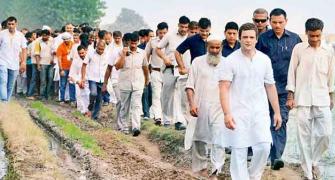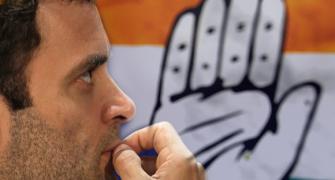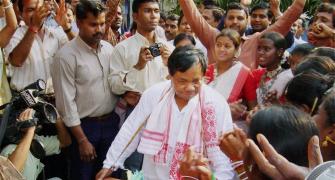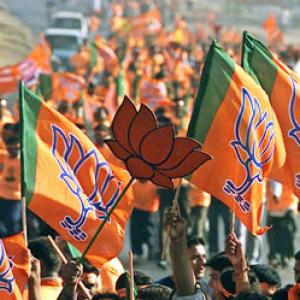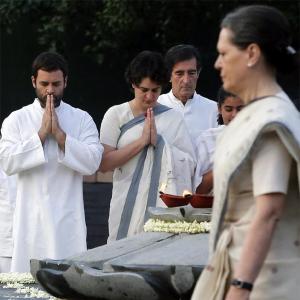'Where he used to sit bored, sulky and fiddling with his cell phone in the Lok Sabha (and was often missing during key debates) he is now noisy, aggressive and ready to lead his flock into the well of the House,' says Sunil Sethi.
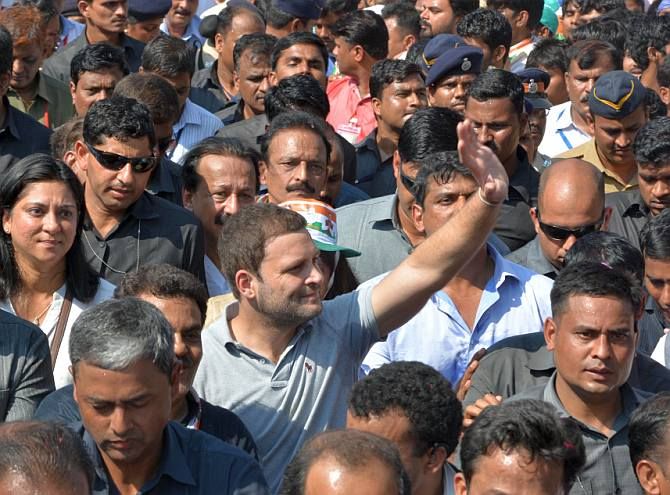
A couple of days ago a few Congress leaders gathered in Uttar Pradesh and held a yagya. Their fervent prayer was to make Priyanka Gandhi the face of assembly elections. Their slogan: 'Desh mein Rahul, Pradesh mein Priyanka (Let Rahul lead the country, and Priyanka head the state).'
In November when the Congress won the Ratlam by-election with a large majority, its first parliamentary success in Madhya Pradesh in ages, its strength in the Lok Sabha went up a notch, from 44 to 45. This was cause for much handclapping and back-slapping in the party.
Coming shortly after the triumph of the Congress-promoted Mahagathbandhan in Bihar, an alliance believed to have been sealed by Rahul Gandhi, the credit also incrementally accrued to him. Ratlam, after all, is a reserved tribal constituency and fits in nicely with his agitation for tribals' rights.
Is the Gandhi scion ready to take on the bigger challenge of state elections in Uttar Pradesh and Punjab next year -- accept the 'Rahul-for-PM' idea, first mooted by M Veerappa Moily, in 2019? At 46, has he finally grown up -- or are the new histrionics a mere restoration drama?
At about this time a year ago Rahul Gandhi had vanished into thin air. His sudden two-month disappearance from public life, described by his mother as a leave of absence but by associates as a voyage of self-discovery, has not gone to waste.
Where the party's vice-president and heir apparent used to sit bored, sulky and fiddling with his cell phone in the Lok Sabha (and was often missing during key debates) he is now noisy, aggressive and ready to lead his flock into the well of the House.
Where his widely YouTubed pre- and post-election TV appearances such as the disastrous interview with Arnab Goswami, or foolish sheepish grin when Sonia Gandhi conceded the party's abject defeat, earned him censure and contempt, he now comes up with memorably cheeky hit-and-run phrases like 'suit-boot ki sarkar' and 'fair and lovely' to describe whitewashing of black money.
And where he only sporadically swung into action, getting arrested at Bhatta Parsaul in Uttar Pradesh to protect farmers' land rights, he's now all over the place, wooing the campus vote at JNU and in Hyderabad, leading election rallies and constantly meeting visitors at his 12, Tughlak Lane residence.
This is Rahul Gandhi cementing his newly liberal -- 'neo-liberal' -- credentials.
And another thing: Rahul Gandhi seems to understand his handicaps and limitations better. In 1985 his father Rajiv Gandhi gained fame for delivering his 'powerbrokers' speech at the AICC centenary, excoriating the 'vested interests' -- meaning the corrupt old guard that ruled the roost in the party. But he failed to clean up the party.
Rahul Gandhi's own efforts to purge the Youth Congress -- which he heads -- by overhauling the organisation from the bottom up did not get far. He's again trying to reform the party's state units by introducing young blood as spokespersons -- but it remains a work in progress.
Just as he can't do much about well-entrenched vested interests (they may even have their uses) there's nothing he can do about his to-the-manor-born image. Narendra Modi painted the 2014 election as a battle between a shehzada (prince) and chaiwallah (tea seller).
Despite his scruffy, rumpled, look in contrast to the prime minister's tip-top, colour-coded, sharpish bandhgalas and kurtas, the fact is that Mr Gandhi is a neo-maharaja.
And, moreover, surrounded by them: His cohorts in Parliament include political scions like Jyotiraditya Scindia, Gaurav Gogoi, Sushmita Mohan Dev and Deepender Singh Hooda. Starting with himself the party bristles with dynastic successors -- much as he would like to curtail the contagion, he is in no position to act.
Recently, when the matter of candidate selection to the Hebbal assembly seat in Bengaluru came up, Sonia Gandhi firmly overruled Chief Minister Siddaramaiah's choice to give the ticket to C K Abdul Rahman Sharief, party leader C K Jaffer Sharief's grandson.
He is obliged to defer his likes and dislikes to the party president who combines shrewd political experience with a preserving maternal instinct.
For instance, Mr Gandhi's well-known antipathy to Lalu Prasad had made him keen to go it alone in the Bihar election. It is said to be Sonia Gandhi's counsel that helped seal the grand alliance with the RJD, which came out on top.
He has also inherited some of his late uncle Sanjay Gandhi's brash impetuosity. Its lowest point was when he barged into the Delhi Press Club to tear up the government's convicted lawmakers' ordinance, to the acute embarrassment of the prime minister and party leaders. 'What our government has done is wrong,' he announced. But as a leading light of a numerically weak Opposition, leading his storm troopers to disruption is par for the course.
Rahul Gandhi's restoration drama is a composite of three facets: As neo-liberal, neo-maharaja and neo-Sanjayite.


